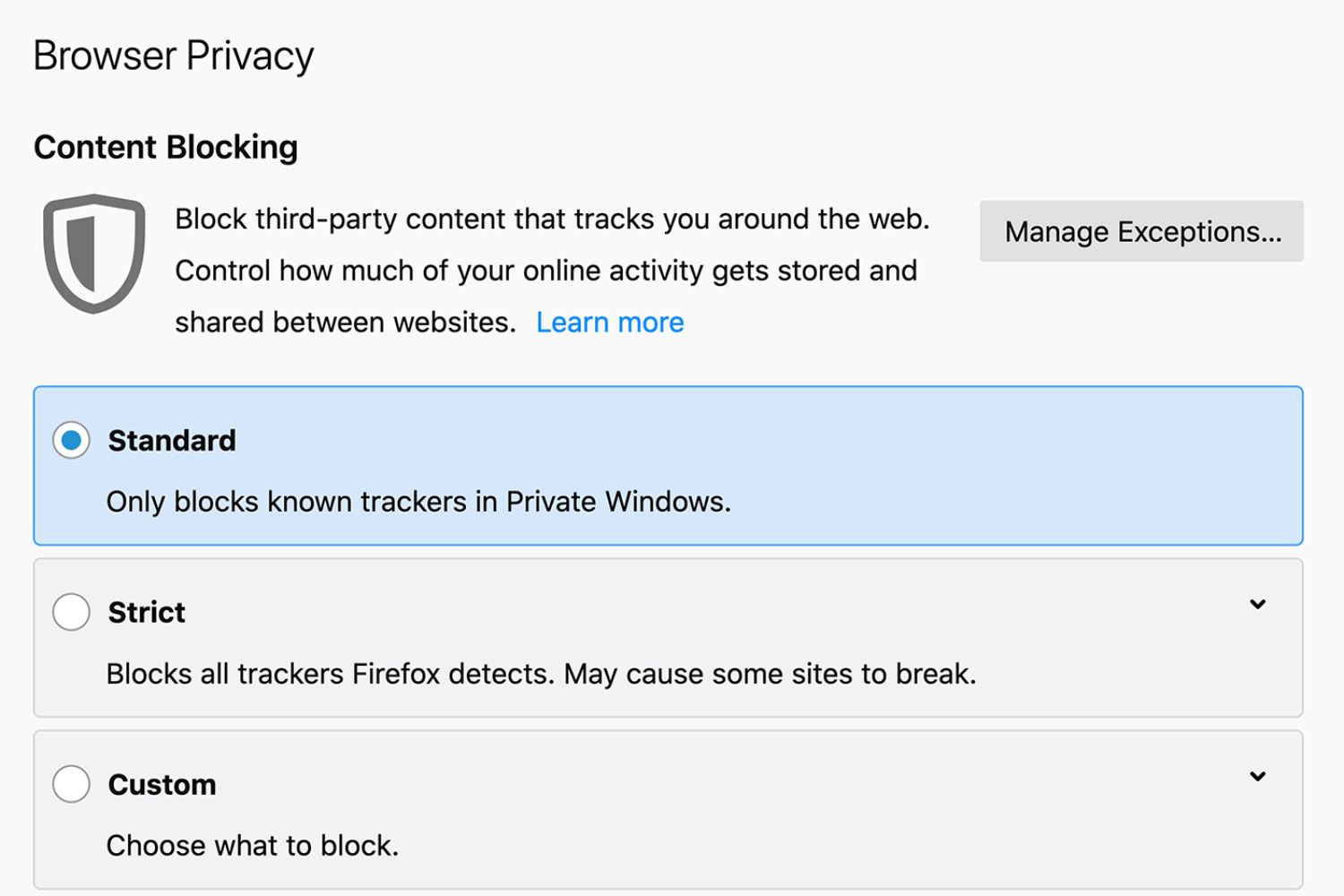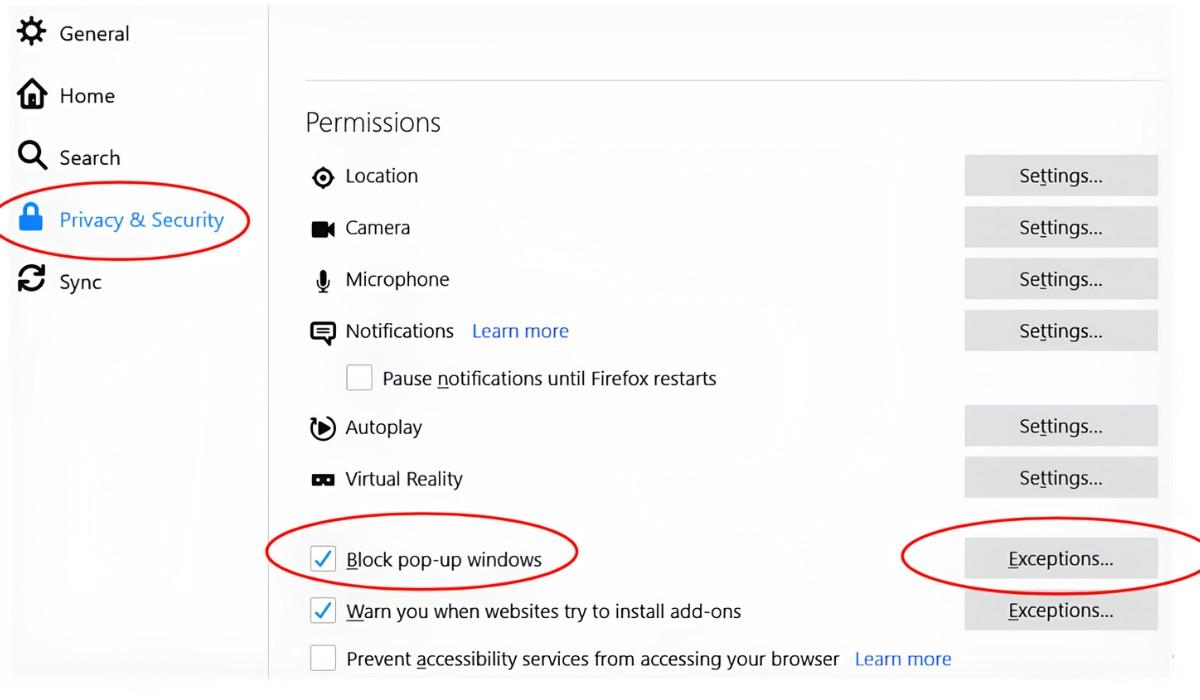Introduction
Are you tired of being bombarded with intrusive ads while browsing the web using Firefox? You're not alone. The good news is that there are effective ways to block these pesky ads and enjoy a smoother, distraction-free browsing experience. In this article, we'll explore various methods to block ads in Firefox, allowing you to take back control of your online activities.
Whether you're annoyed by pop-ups, banner ads, or video commercials that disrupt your browsing flow, finding a solution to block them can significantly enhance your online experience. By implementing the methods outlined in this article, you can not only eliminate the annoyance of ads but also improve the speed and security of your browsing sessions.
Now, let's dive into the different methods you can use to block ads in Firefox. We'll start by exploring the built-in options provided by Firefox itself before delving into the world of ad-blocking extensions. Additionally, we'll discuss how you can take matters into your own hands by editing the hosts file to block ads at the system level.
By the end of this article, you'll have a comprehensive understanding of the tools and techniques available to effectively block ads in Firefox, empowering you to create a more enjoyable and streamlined browsing environment. Let's get started on this ad-blocking journey and reclaim control over your online experience.
Method 1: Using built-in Firefox options
Firefox offers built-in features that allow users to control and customize their browsing experience, including options to block ads without the need for additional extensions. By leveraging these native functionalities, you can effectively reduce the presence of ads while navigating the web.
Tracking Protection
One of the key built-in features in Firefox is Tracking Protection. This feature is designed to block content from known trackers, which often include advertisements. By enabling Tracking Protection, you can significantly reduce the number of ads that appear on websites, leading to a cleaner and less cluttered browsing experience. To activate Tracking Protection, follow these simple steps:
- Open Firefox and click on the menu icon (three horizontal lines) in the top-right corner.
- Select "Preferences" (on macOS) or "Options" (on Windows) to access the settings.
- Navigate to the "Privacy & Security" tab.
- Scroll down to the "Content Blocking" section.
- Choose the "Custom" option and ensure that "Tracking Protection" is enabled.
By enabling Tracking Protection, Firefox will block content from known trackers, which often include ads, resulting in a more streamlined and privacy-focused browsing experience.
Enhanced Tracking Protection
In addition to Tracking Protection, Firefox offers Enhanced Tracking Protection, which goes a step further in blocking known trackers and harmful content. This feature not only enhances privacy but also helps in reducing the presence of ads on websites. To enable Enhanced Tracking Protection, follow these steps:
- Access the Firefox menu and navigate to "Preferences" (on macOS) or "Options" (on Windows).
- Go to the "Privacy & Security" tab.
- Scroll down to the "Content Blocking" section.
- Under "Custom," ensure that "Enhanced Tracking Protection" is enabled.
By activating Enhanced Tracking Protection, you can enjoy a more secure and ad-light browsing experience, as Firefox will actively block known trackers and potentially harmful content.
By utilizing these built-in options within Firefox, you can effectively block ads and enhance your browsing experience without the need for additional extensions or third-party tools. These features not only reduce the visual clutter caused by ads but also contribute to a more private and secure online environment.
Method 2: Using ad-blocking extensions
While Firefox provides built-in features to block ads, users can further enhance their browsing experience by utilizing ad-blocking extensions. These extensions are specifically designed to target and eliminate various forms of online advertisements, offering a more comprehensive solution for those seeking an ad-free environment.
Benefits of ad-blocking extensions
Ad-blocking extensions offer several benefits, including the ability to selectively block different types of ads, such as pop-ups, banners, and video ads, across a wide range of websites. Additionally, these extensions often provide customizable settings, allowing users to tailor their ad-blocking preferences to suit their individual browsing habits.
Popular ad-blocking extensions for Firefox
-
uBlock Origin: Widely regarded as one of the most effective ad blockers, uBlock Origin is known for its efficient resource usage and extensive filter lists. It offers advanced features for users who want granular control over their ad-blocking settings.
-
AdBlock Plus: With a user-friendly interface and customizable filter lists, AdBlock Plus is a popular choice for those seeking a straightforward ad-blocking solution. It also allows users to support their favorite websites by allowing non-intrusive ads.
-
AdGuard AdBlocker: Known for its robust ad-blocking capabilities and privacy protection features, AdGuard AdBlocker effectively filters out intrusive ads while safeguarding user privacy.
Installing ad-blocking extensions in Firefox
To install an ad-blocking extension in Firefox, follow these simple steps:
- Open Firefox and navigate to the menu icon (three horizontal lines) in the top-right corner.
- Select "Add-ons" to access the Firefox Add-ons Manager.
- In the Add-ons Manager, search for the desired ad-blocking extension, such as uBlock Origin or AdBlock Plus.
- Click "Add to Firefox" next to the chosen extension to initiate the installation process.
- Once installed, the ad-blocking extension will be active, providing a seamless browsing experience with reduced ads.
Customizing ad-blocking settings
After installing an ad-blocking extension, users can often customize their settings to fine-tune the ad-blocking experience. This may include whitelisting specific websites, creating custom filter lists, or adjusting the level of ad blocking based on individual preferences.
By leveraging ad-blocking extensions, Firefox users can enjoy a more streamlined and ad-free browsing experience, tailored to their specific preferences and privacy concerns. These extensions serve as valuable tools in combating the intrusion of online advertisements, allowing users to reclaim control over their online activities.
Method 3: Editing the hosts file
Another effective method to block ads in Firefox involves editing the hosts file on your computer. The hosts file is a local system file that maps hostnames to IP addresses. By strategically modifying this file, you can prevent your browser from connecting to servers that serve ads, effectively blocking them from appearing during your browsing sessions.
Here's how you can edit the hosts file to block ads in Firefox:
-
Locate the hosts file: The hosts file is typically located in the following directory:
- Windows: C:\Windows\System32\drivers\etc\
- macOS and Linux: /etc/hosts
-
Open the hosts file: Using a text editor with administrative privileges, such as Notepad on Windows or Terminal on macOS and Linux, open the hosts file.
-
Edit the hosts file: Add the IP address "0.0.0.0" followed by the hostname of the ad server to block. For example:
0.0.0.0 ad.doubleclick.net
-
Save the changes: After making the necessary modifications, save the hosts file.
-
Flush DNS cache: To ensure that the changes take effect, flush the DNS cache on your computer. On Windows, you can do this by running the command "ipconfig /flushdns" in Command Prompt with administrative privileges. On macOS and Linux, you can use the command "sudo killall -HUP mDNSResponder" in Terminal.
By editing the hosts file in this manner, you effectively redirect requests to ad servers to a non-existent IP address, preventing the ads from being loaded in your browser. This method provides a system-wide ad-blocking solution that extends beyond the confines of the Firefox browser, offering comprehensive coverage across various applications and web browsers on your computer.
While editing the hosts file can be an effective ad-blocking method, it's important to exercise caution and ensure that you only modify the file to block known ad servers. Additionally, regularly updating the hosts file with new ad server entries can help maintain its effectiveness in blocking ads across different websites.
By leveraging the hosts file to block ads, you can take proactive control over the content that is allowed to reach your browser, creating a more streamlined and ad-free browsing experience within Firefox and beyond.
Conclusion
In conclusion, the quest to block ads in Firefox has led us through a journey of exploring various methods to reclaim control over our online browsing experience. By leveraging the built-in options provided by Firefox, such as Tracking Protection and Enhanced Tracking Protection, users can effectively reduce the intrusion of ads while prioritizing privacy and security. These native features empower users to create a more streamlined and ad-light environment without the need for additional extensions or tools.
Furthermore, the utilization of ad-blocking extensions presents a compelling solution for those seeking a comprehensive ad-free browsing experience. With the ability to selectively block different types of ads and customize ad-blocking settings, users can tailor their online environment to align with their individual preferences and privacy concerns. The seamless integration of ad-blocking extensions into Firefox enhances the overall browsing experience, allowing users to navigate the web with reduced distractions and visual clutter.
Additionally, the method of editing the hosts file provides a system-wide ad-blocking solution that extends beyond the confines of the Firefox browser. By strategically modifying the hosts file, users can effectively prevent their browsers from connecting to servers that serve ads, offering a proactive approach to blocking ads across various applications and web browsers on their computers.
In the ever-evolving landscape of online advertising, the pursuit of an ad-free browsing experience remains a priority for many users. Whether it's to minimize distractions, enhance privacy, or improve the speed and security of online activities, the methods outlined in this article empower users to take back control of their online experience within the Firefox browser.
As we conclude this exploration of ad-blocking methods in Firefox, it's important to recognize the value of striking a balance between ad blocking and supporting content creators. While ad blocking offers a more streamlined browsing experience, it's essential to consider alternative ways to support the websites and creators whose content we enjoy. Whether it's through direct contributions, subscriptions, or engaging with non-intrusive ads, finding a sustainable approach to supporting online content remains a crucial consideration in the ad-blocking conversation.
Ultimately, the methods discussed in this article equip users with the knowledge and tools to navigate the digital landscape with greater autonomy and control. By implementing these ad-blocking methods in Firefox, users can curate a browsing environment that aligns with their preferences, fostering a more enjoyable and personalized online experience.

























